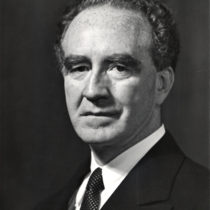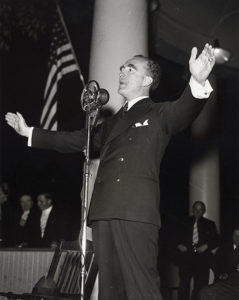Magazine

The Dissenter
When the Supreme Court ruled in 1944 that Japanese internment during WWII was legal, Justice Frank Murphy’s dissent was a ringing voice amid a hostile cacophony. Through his archived papers at the Bentley, we take a look at the ways in which Murphy was a man ahead of his time—and what made him willing to take a stand against legalized prejudice.
by Robert Havey
Fred Korematsu was arrested on May 30, 1942, on the streets of San Leandro, California, for the crime of being of Japanese descent. Korematsu, born in Oakland, California, was in violation of Civilian Exclusion Order No. 34, which demanded every person of Japanese ancestry in “Military Area No. 1” (essentially all of California within 100 miles of the Pacific Ocean) report to “assembly centers” where they would be relocated to internment camps for the duration of the war. While he was imprisoned, lawyers from the ACLU asked Korematsu if he would be willing to be the test case in their legal fight against Japanese internment. Korematsu agreed.
The case found its way to the Supreme Court in 1944 where, in a 6-3 decision, it was ruled that Korematsu’s imprisonment was constitutional. The majority opinion written by Justice Hugo Black emphasized it was “military urgency” that justified internment, not racial prejudice. The nation was at war with the Japanese Empire and the forced removal of Japanese Americans was “a military imperative.”
The decision in Korematsu v. United States has been a stain on the reputation of the Supreme Court ever since. It’s considered by many contemporary justices as part of the court’s “anticanon” decisions like Dred Scott v. Sandford (former slaves could not be citizens), and Plessy v. Ferguson (separate but equal), where the court emphatically ruled on the wrong side of history. Forty-four years after the Korematsu case, President Reagan signed into law the Civil Liberties Act of 1988, formally apologizing to Japanese Americans for their treatment in WWII and paying restitution to each person held in an internment camp.
Perhaps the only redeeming aspect to the legacy of Korematsu was the fiery dissent written by Justice Frank Murphy. Murphy rejected Justice Black’s rational of military necessity, saying internment of Japanese citizens “falls into the ugly abyss of racism.” Murphy points out that in the report given to the court by Lt. General John L. DeWitt in support of the internment program, DeWitt refers to those of Japanese descent as “subversive” and says they belong to an “enemy race.” Murphy’s argument concludes:
“I dissent, therefore, from this legalization of racism. Racial discrimination in any form and in any degree has no justifiable part whatever in our democratic way of life. It is unattractive in any setting, but it is utterly revolting among a free people who have embraced the principles set forth in the Constitution of the United States. All residents of this nation are kin in some way by blood or culture to a foreign land. Yet they are primarily and necessarily a part of the new and distinct civilization of the United States. They must, accordingly, be treated at all times as the heirs of the American experiment, and as entitled to all the rights and freedoms guaranteed by the Constitution.”

Frank Murphy giving a speech circa 1936. HS9506
Murphy’s dissent was a principled stand for individual rights at a time when the United States was panicked at the idea of a Japanese invasion in the aftermath of Pearl Harbor. His blunt condemnation of racism was unheard of at the time. In fact, Murphy was the first to use the word “racism” in a Supreme Court decision—a word that wouldn’t be used by another Justice until 1966. While Murphy’s Korematsu opinion now seems singularly ahead of its time, many of Murphy’s contemporaries saw it as another zealous stand by the court’s “crusader.” To them, according to biographer Sidney Fine, Murphy was a “humanitarian” rather than a principled jurist, who put “heart over head” when rendering verdicts, having “little respect for the traditional role of the court.”
Was Murphy a judicial visionary or a soft-hearted dilettante? The Frank Murphy papers at the Bentley chronicle each part of his life as a lawyer, soldier, politician, and judge, all of which led to his historic Korematsu dissent.
Help and Relief to the Troubled
Frank Murphy was born and raised in Harbor Beach, Michigan, within a close-knit Irish American family. The Murphy household was religious, but Frank’s father, John Murphy, told his son at an early age to “stay close to the church, but away from the organization.”
A few years after graduating from the University of Michigan (B.A. 1912, LL.B. 1914), Murphy enlisted in the Army. He joined too late to see any combat in World War I, but he did discover what he thought could be his true calling. As an officer with a law degree, he was often called upon to represent fellow soldiers in court martial proceedings. He wrote to his mother in 1918: “To me there is deep satisfaction in giving help and relief to the troubled and depressed. I would rather do that than any other task I know.”
Returning home to Michigan, Murphy spent three years as an assistant district attorney until he won a seat on the Detroit Recorder’s Court, the highest criminal court for the city. Murphy was judge for only two years before he presided over possibly the most important case in the history of the Recorder’s Court. Ossian Sweet, a black physician, was charged with the murder of a white man. Sweet had purchased a house on the fringe of a “white neighborhood” in Detroit. An angry mob formed outside his house with the intention of intimidating Sweet and his family into moving. It was a tactic that had worked before. On the second night, a rock thrown by someone in the mob shattered a window. A volley of gunfire came from the second story of the house, killing one in the crowd and injuring another. The police entered the house and arrested everyone inside, including Sweet. He was charged with murder.
The ACLU, recognizing the significance of the case, recruited legendary defense lawyer Clarence Darrow to defend Sweet. Murphy assigned himself to the case as presiding judge, both because other judges were hesitant to take such a politically volatile case and for admittedly self-serving reasons. He saw the opportunity to demonstrate “sincere liberalism and judicial integrity.”
The first Sweet trial ended with a hung jury. Three holdouts in the all-white jury prevented conviction. The prosecutor brought charges against Sweet again later in 1926, but thanks to an eight-hour closing argument from Darrow, Sweet was acquitted. Murphy’s main contribution to the case was to allow Darrow and the defense to present Sweet’s previous encounters with racism to the jury. Sweet’s fear for his life in the face of racial hatred was a key part of Sweet’s contention that the shots had been fired in self-defense.
Murphy was amazed by Darrow, especially in the second trial. He described watching Darrow’s closing arguments as “the greatest experience of my life.” He said Darrow was “the most Christ-like man I have ever known.”
Michigan in Hard Times
Murphy’s work on the Recorder Court launched his career in politics. He was elected Mayor of Detroit in 1930, ousting KKK-supported Charles Bowles. Detroit had been hit hard by the Great Depression, and Murphy did his best to help the masses of unemployed workers, distributing welfare funds to provide for basic needs. He insisted that no Detroiter would go hungry just because they were out of a job.
Murphy’s work as Mayor and judge caught the attention of President Franklin Roosevelt. Murphy had been a big supporter of Roosevelt’s New Deal policies and was promised a place in the administration. Murphy was hoping to be appointed Attorney General, but was instead made Governor-General of the Philippines. After three years in Manila, Roosevelt asked Murphy to run for Governor of Michigan.
Murphy’s first days as Governor started in crisis. Auto workers in Flint were staging a sit-down strike, taking over a key General Motors plant and halting production. Because the workers were in the factory, not picketing outside, the GM-friendly local police couldn’t disperse the strikers without breaking in and potentially damaging valuable equipment. Murphy started to mediate between the then-fledgling UAW and GM. After a few days of negotiation, talks were abruptly halted when local police attempted to charge the plant with tear gas. Blasts from fire hoses and a rain of metal auto parts repelled the invasion. The police fired their pistols as they retreated, injuring 14 workers.
Murphy called in the National Guard, not to break the strike as many were expecting, but to keep the peace. After many long days of negotiation, Murphy brokered a deal. GM recognized UAW as its collective bargaining partner. UAW’s membership skyrocketed after the strike, starting a new era of labor relations.
After narrowly losing his reelection bid, Murphy was appointed Attorney General of the United States. He didn’t stay long. Murphy was selected for a spot on the Supreme Court just a year later.
An Instinctive Sense of Justice
Murphy was the fifth Supreme Court Justice appointed by Roosevelt, making him part of a “New Deal” majority. Roosevelt had clashed many times with the court and Congress about the implementation of his New Deal programs, and many feared Murphy represented the destruction of a check on the president’s power. Murphy, who hadn’t been a judge for over a decade, was seen—as one legal journal put it—as a “legal illiterate” and a “New Deal political hack” in the service of the president.
Murphy ruled against Roosevelt’s agenda many times, including in Korematsu, acquitting him of the charge of being in the president’s pocket. Murphy himself admitted that he was no legal scholar, and his ambivalence to legal theory frustrated many of his contemporaries. Fine wrote that Murphy expended no “effort to fill the gaps in his legal knowledge.” Fine hypothesized that “a Supreme Court made up of nine Frank Murphys” would be “a disaster.”
Murphy’s lack of legal guile might have been the reason he was able to write such an iconoclastic opinion in Korematsu. According to Fine, Murphy didn’t make a complex legal argument against Japanese internment, rather he relied on his “instinctive sense of justice” and his “rich and varied experience in dealing with persons of different races and creeds.”
It’s likely that Murphy would have seen the critiques of his career as no great insult. He was an unabashed idealist. In one of his 199 Supreme Court opinions, Murphy wrote, “The law knows no finer hour than when it cuts through formal concepts and transitory emotions to protect unpopular citizens against discrimination and persecution.”
Murphy remained on the Supreme Court until his death from coronary thrombosis on July 17, 1949, at age 59. He is buried in his hometown of Harbor Beach.
